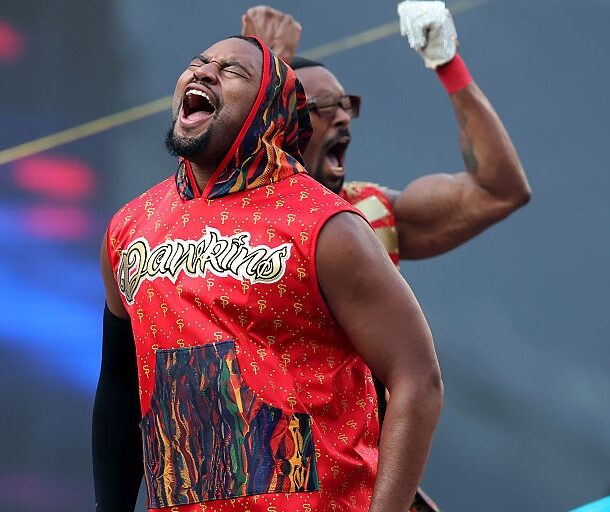
Stay
UpdateD
Join the BPC
Email List
Stay up to date on exciting projects and upcoming events from the Black Promoters Collective.

Felicia Pride is committed to curating stories centered on the honeys.
Storytelling came to Pride, who serves as co-executive producer on Peacock’s Bel-Air and is behind the upcoming A Different World sequel pilot at Netflix, by way of hip-hop. She is someone who grew up on the genre and wrote the lyrics to songs down in a red spiral notebook, and this invigorated a passion for documenting and displaying the narratives of everyday people who look like her.
“I always say that before I knew Toni Morrison and James Baldwin, I knew Queen Latifah and Big Daddy Kane,” Pride told Blavity. “They were my storytellers, and I started to, you know, unconsciously or subconsciously, study their storytelling. I didn’t realize that’s what it was at the time. But then I found myself becoming a writer and doing a lot of things that emcees do, whether it’s inserting the eye into the storytelling, or having a sort of perspective, having a rhythm in the writing. It really came from hip-hop.”
As the creator of Honey Chile, an independent media and production company focusing on content made for, by, or about Black women aged 40 and above, Pride’s latest endeavor includes a novella, Come Close, centered on a woman who is considered one of the honeys.
“We write what we want to see in our lives, right? So, I put it out there for myself,” Pride said. “But also, just this idea that after 40 we still are love interests. We still have love interests. We still want to be desired. We still have desires. I think media is such a powerful tool [and] vehicle to really show the layers and levels of people who are not normally centered. For me, that’s just been the gist of what the aim of my work across books, film and TV is — to really add to the humanity of people who are not normally centered.”
She added, “I just wanted the honeys to see themselves being loved on and wanted honeys to be doing the loving and desiring, and so that’s where Come Close originated.”
The novella follows character Amaya Ellis, a seasoned television and film producer who gets a second chance at love with her high school sweetheart, Kyrie Tate. Although the book may seemingly encourage the notion of spinning the block, as we’ve seen in the media with couples like Nelly and Ashanti, Pride said she’s here for it — but to do it with intention.
“I don’t necessarily encourage all spinning of the block,” Pride said with a chuckle. “You know what I mean? There’s usually just one who it wasn’t about any transgressions, it was time. The timing wasn’t right.”
“I think sometimes if we’re thinking about spinning the block, I don’t think that transgression should be involved,” she continued. “Personally, I think it should have just been ‘if we had met each other a little later, we would have been able’ because the timing just wasn’t right. Looking at those types of factors on why it didn’t work the first time versus, like, they did some messed-up stuff to you, now you forgive them. Hey, that might work too, but in this particular Come Close [story], it was really the timing and different intentions at the time. It wasn’t that they did anything mean to each other.”
On the other hand, Pride reminded us that this is also a tale of remaining open to love.
“I think the opening up to love is really big,” she explained. “I think that there’s a number of women who have been hurt, and don’t want to be hurt again. Like, how do we find that balance of, yes, I think there has to be discernment, but also, we deserve big loves, and how do we prepare ourselves to receive big love? For me, that meant therapy. That meant unpacking a lot of things and looking at my own choices. That means better boundaries — so, wanting women to be open to love, but also a healthy love.”
Baltimore serves as the backdrop for the characters in Come Close, and it’s not the first time Pride has used her work to showcase hometown pride in a way that is authentic to her.
“There’s a lot of references to Baltimore figures, to Baltimore places. One of the places that they end up meeting up at is this iconic Black club. It was important to have that spirit of the people Amaya connects with, [like] her high school home girls, and having [Baltimore] in there and really sort of making it feel like its own character in a lot of ways,” Pride said.
“I directed my short film, Look Back at It, which is a proof of concept for a feature film, in Baltimore, and it was really important to me to show a Baltimore that I feel like we don’t see often enough, which is why it was important for me to show trees,” she continued. “We shot it at my aunt’s house, and just also the feeling of community, the feeling that — the spirit of the people, trying to get that in there as well, that’s how I approached it.”
From working on shows like Bel-Air and Queen Sugar, among others, Pride’s commitment to telling Black stories remains evident, and she aims to continue pouring her heart and soul into narratives that uplift women who look like her.
“I hope it expands the conversation,” Pride said, reflecting on what she hopes those reading Come Close walk away with. “I think the desire piece is huge for us as a cornerstone of our storytelling, where Black women are not afraid of our desires and to name them, claim them and experience them. Also, Black women being able to write their own stories, produce their own stories and direct their own stories. Black women of all stripes being able to see themselves represented on screen, on the page and in audio across all mediums.”
Stay up to date on exciting projects and upcoming events from the Black Promoters Collective.

©2025 Black Promoters Collective (BPC) All Rights Reserved.